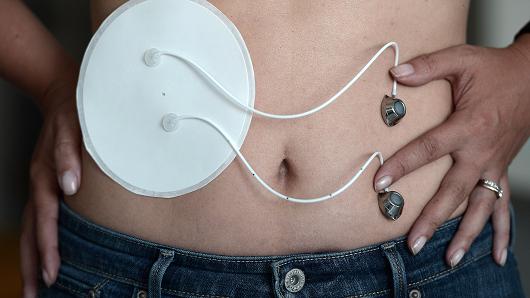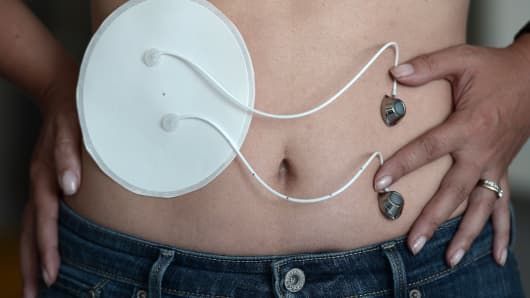For people with type 1 diabetes, life is a perpetual tightrope act. They must carefully monitor the dosage and timing of insulin injections that allow them to teeter on the high wire that is optimum glucose control. Too little insulin, and their glucose levels rise, leaving them at risk over time for complications such as blindness and kidney failure; too much insulin and hypoglycemia (low blood glucose) results, making them vulnerable to coma or, in extreme circumstances, even death.
Now researchers studying type 1 diabetes believe they have found a way to help patients avoid the tightrope walk altogether. Several academic and commercial groups are conducting clinical trials for the latest generation of what’s known as the artificial pancreas. Contrary to what the name might suggest, artificial pancreas systems involve no transfer of tissue. Rather, the term refers to a complex technology that uses computer algorithms to automatically and continuously sense a person’s unique blood glucose balance and then substitute the endocrine function of a healthy pancreas.
The new technology is a part of what the President’s Council of Advisors on Science and Technology refer to as personalized medicine — which the organization defines as “the tailoring of medical treatment to the individual characteristics of each patient.”
One company at the forefront of this approach is Dublin-based Medtronic, which estimates that its advanced version of an artificial pancreas system could be in the marketplace by next year. Meanwhile, a team of researchers led by Dr. Boris Kovatchev, director of theUniversity of Virginia Center for Diabetes Technology, has announced that the group will begin final clinical trials this summer on another artificial pancreas system developed by the University and refined for clinical use by the start-up company TypeZero Technologies.
Still other research programs are in progress at Cambridge University and also at Boston University, where a team led by Professor Edward Damiano is developing a product that will measure both insulin and glucagon, a peptide hormone that works to raise the concentration of glucose in the bloodstream.
Dr. Marc Breton, associate professor at UVA’s Center for Diabetes Technology, says the technology behind artificial pancreas systems is being improved and refined daily. “The algorithms it is based on are resulting in better and better outcomes. For people with type I diabetes, it’s quite a hopeful time.”
NEW HOPE FOR MILLIONS
A key player in the development of the artificial pancreas was JDRF, previously known as the Juvenile Diabetes Research Foundation. Several years ago, despite awareness that artificial pancreas technology could be helpful for type 1 diabetes, there was little interest from the industry to develop the product. JDRF’s chief mission officer, Aaron Kowalski, Ph.D., stepped in to persuade industry and regulatory officials that the technology was worthwhile and could be successfully marketed. The organization has since funded millions of dollars’ worth of research in the field.
The hope is that the new systems can transform the lives of the estimated 1.25 million U.S. individuals who suffer from type 1 diabetes and the estimated 80,000 children around the globe who are diagnosed each year. Marked by the immune system’s destruction of beta cells in the pancreas, type 1 diabetes is typically diagnosed in childhood or adolescence.
Compared to patients with type II diabetes, type 1 patients don’t use insulin efficiently, making them dependent on daily injections or a conventional insulin pump. In children, this can be especially worrisome because without constant monitoring, dangerously low glucose levels may go undetected in the overnight hours. Parents typically must awaken several times during the night to test their children’s levels and then be prepared to intervene on a moment’s notice.
.[“source -cncb”]



